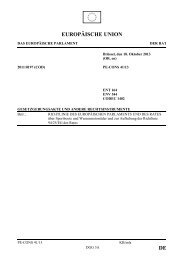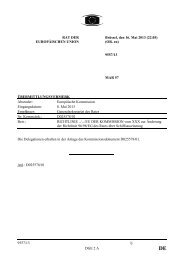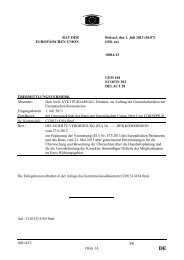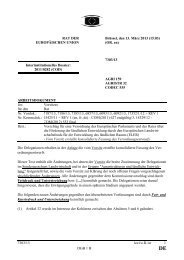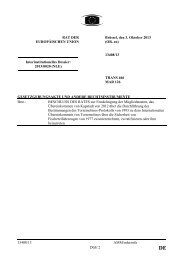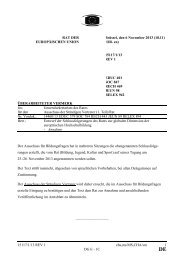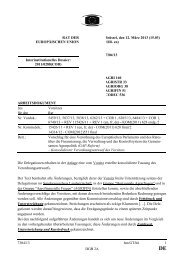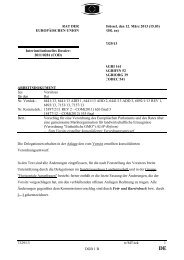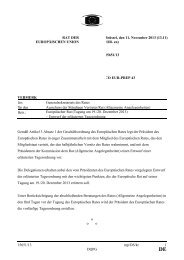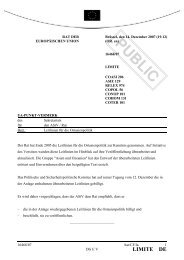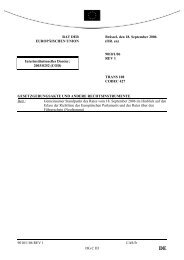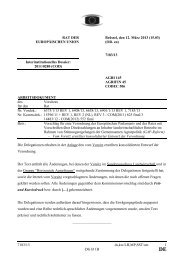5826/13 BB/sc 1 DG E 2 A COU CIL OF THE EUROPEA U IO ...
5826/13 BB/sc 1 DG E 2 A COU CIL OF THE EUROPEA U IO ...
5826/13 BB/sc 1 DG E 2 A COU CIL OF THE EUROPEA U IO ...
Create successful ePaper yourself
Turn your PDF publications into a flip-book with our unique Google optimized e-Paper software.
<strong>COU</strong><strong>CIL</strong> <strong>OF</strong><br />
<strong>THE</strong> <strong>EUROPEA</strong> U<strong>IO</strong><br />
Interinstitutional File:<br />
2012/0284 (LE)<br />
Brussels, 15 February 20<strong>13</strong><br />
<strong>5826</strong>/<strong>13</strong><br />
TRAS 30<br />
“I/A” ITEM OTE<br />
from: General Secretariat of the Council<br />
to: Coreper/Council<br />
Nº Cion prop.: 15015/12 TRANS 336<br />
Subject: Proposal for a <strong>COU</strong>N<strong>CIL</strong> DECIS<strong>IO</strong>N on the position to be adopted, on behalf of<br />
the European Union, in the Group of Experts on the European agreement<br />
concerning the work of crews of vehicles engaged in international road transport<br />
(AETR) of the United Nations Economic Commission for Europe<br />
1. The Commission submitted the above-mentioned proposal for a Council Decision on 12<br />
October 2012 on the position to be adopted, on behalf of the European Union, in the Group of<br />
Experts on the European agreement concerning the work of crews of vehicles engaged in<br />
international road transport (AETR) of the United Nations Economic Commission for Europe.<br />
2. In order to reflect the di<strong>sc</strong>ussions at Working Party level, the Irish Presidency prepared a<br />
compromise text which all delegations could accept. The new text appears in bold and<br />
strikethrough.<br />
3. In the light of the above, Coreper is invited to approve this text and to endorse the recommended<br />
EU position, so that it can be presented at the AETR Group of Experts meeting which will take<br />
place in Geneva on 25 February.<br />
________________<br />
<strong>5826</strong>/<strong>13</strong> <strong>BB</strong>/<strong>sc</strong> 1<br />
<strong>DG</strong> E 2 A E
Proposal for a<br />
<strong>COU</strong><strong>CIL</strong> DECIS<strong>IO</strong><br />
AEX<br />
on the position to be adopted, on behalf of the European Union, in the Group of Experts on<br />
the European agreement concerning the work of crews of vehicles engaged in international<br />
road transport (AETR) of the United ations Economic Commission for Europe<br />
<strong>THE</strong> <strong>COU</strong>N<strong>CIL</strong> <strong>OF</strong> <strong>THE</strong> <strong>EUROPEA</strong>N UN<strong>IO</strong>N,<br />
(Text with EEA relevance)<br />
Having regard to the Treaty on the Functioning of the European Union, and in particular Article 90,<br />
in conjunction with Article 218(9) thereof,<br />
Having regard to the proposal from the European Commission,<br />
After having informed the European Parliament,<br />
Whereas:<br />
<strong>5826</strong>/<strong>13</strong> <strong>BB</strong>/<strong>sc</strong> 2<br />
ANNEX <strong>DG</strong> E 2 A E
(1) As stated by the Court of Justice 1 the area of the work of crews of vehicles engaged in road<br />
transport is an exclusive external competence of the European Union. This competence has<br />
been exercised internally notably by the adoption of Council Regulation (EEC) No 543/69<br />
of 25 March 1969 on the harmonization of certain social legislation relating to road<br />
transport 2 , Council Regulation (EEC) No 3820/85 of 20 December 1985 on the<br />
harmonization of certain social legislation relating to road transport 3 , Council Regulation<br />
(EEC) No 3821/85 of 20 December 1985 on recording equipment in road transport 4 and<br />
more recently by Regulation (EC) No 561/2006 of the European Parliament and of the<br />
Council 5 . Since the subject matter of the AETR falls within the <strong>sc</strong>ope of Regulation<br />
561/2006, the power to negotiate and conclude the Agreement lies with the Union. The rules<br />
in the area of the work of crews of vehicles engaged in road transport with third countries,<br />
including the rules on the recording equipment used to ensure their compliance, are a matter<br />
falling both under the EU Regulations and under the AETR agreement. It is imperative that<br />
these rules are harmonized;<br />
(2) The particular circumstances in which the AETR negotiations took place warrant, by way of<br />
exception, a procedure whereby the Member States of the Union individually deposited the<br />
instruments of ratification or accession in a concerted action but nonetheless acted in the<br />
interest and on behalf of the Union;<br />
(3) In the framework of the AETR Agreement, the Group of Experts on the European<br />
agreement concerning the work of crews of vehicles engaged in international road<br />
transport ("Group of Experts") has been established by the United ations Economic<br />
Commission for Europe, as a body which should aim at developing proposals for<br />
amending AETR Agreement, and in particular its Article 22bis.<br />
1 Judgment of the Court of Justice of 31 March 1971, AETR, Case 22/70.<br />
2 OJ L 77, 29.3.1969, p.49.<br />
3 OJ L 370, 31.12.1985, p. 1.<br />
4 OJ L 370, 31.12.1985, p. 8.<br />
5 OJ L 102, 11.4.2006, p. 1.<br />
<strong>5826</strong>/<strong>13</strong> <strong>BB</strong>/<strong>sc</strong> 3<br />
ANNEX <strong>DG</strong> E 2 A E
(3a) The next meeting of the Expert Group of Experts will take place on 3 December 2012 25<br />
February 20<strong>13</strong>. On that occasion the expert Group of Experts will possibly examine<br />
proposals made by Contracting Parties which, if they are accepted by the Group of<br />
Experts, may lead to are leading to an amendment of AETR, after a procedure for the<br />
revision of AETR is launched and concluded. This will produce legal effects as referred to<br />
in Article 218 (9) TFEU.<br />
(4) Once the proposals are accepted by the Group of Experts, as a second step, T the EU<br />
Member States as Contracting Parties of AETR are under an obligation to cooperate in order<br />
to engage the mechanism for the revision of the AETR Agreement established in particular<br />
in its Article 21, in accordance with Council Regulation (EEC) 2829/77 of 12 December<br />
1977 on the bringing into force of the European Agreement concerning the work of crews of<br />
vehicles engaged in international road transport (AETR) 6 and in line with the duty of sincere<br />
cooperation pursuant to Article 4 (3) TEU; subject to a possible separate Council decision<br />
in accordance with Article 218 (6) as appropriate. The proposed amendments to the<br />
AETR Agreement will become effective only after the revision of the AETR agreement<br />
is concluded.<br />
(5) In order to achieve a pan-European harmonization in the field of recording equipment in<br />
road transport (tachographs), it is necessary that a unique decision-making process is put in<br />
place, which takes into account the prerogatives of the European Union and the interests of<br />
third countries which are Contracting Parties to the AETR Agreement;<br />
6 OJ L 334, 24.12.1977, p. 11.<br />
<strong>5826</strong>/<strong>13</strong> <strong>BB</strong>/<strong>sc</strong> 4<br />
ANNEX <strong>DG</strong> E 2 A E
(6) Article 22bis of the AETR Agreement currently provides that changes to Council Regulation<br />
(EEC) No 3821/85 concerning the digital tachograph are automatically taken over by all<br />
AETR Contracting Parties, without any formal consultation before the adoption of the<br />
changes by the European Union. As outlined in the Commission's communication "Digital<br />
Tachograph : Roadmap for future activities" 7 , the current mechanism jeopardises the correct<br />
and harmonised implementation of the measures introduced in the proposed revision of<br />
Council Regulation (EEC) No 3821/85 and the digital tachograph by non-EU Contracting<br />
Parties. It is therefore in the interest of the European Union to improve the decision-making<br />
process as regards digital tachographs and AETR and propose in the Group of Experts to<br />
amend accordingly Article 22bis, by creating, in the framework of United Nations Economic<br />
Commission for Europe (UNECE), an Administrative Committee that would define the<br />
technical specifications of the tachograph for the entire AETR area.<br />
(7) The specificities of the AETR Agreement and of the envisaged decision making process in<br />
its newly created committee under Article 22bis in addition to the fact the European Union<br />
has exclusive competence in the area of the work of crews of vehicles engaged in road<br />
transport justifies would justify the accession of the European Union to AETR, which<br />
would also be in line with the AETR Court ruling in the case 22/70 and would also<br />
guarantee the effective representation of the EU’s interests in the UNECE proceedings.<br />
After its accession, which would require a Commission proposal to be submitted in<br />
accordance with Article 218 (6), the Union's position adopted by the Council, in<br />
accordance with Article 218 (9) TFEU will be expressed by the Commission on behalf of<br />
the EU who will exercise in the Administrative Committee the votes of all Member States.<br />
Such an accession should not constitute a precedent as regards any future accession of<br />
the EU to other international organisations.<br />
7 COM(2011) 454 final<br />
<strong>5826</strong>/<strong>13</strong> <strong>BB</strong>/<strong>sc</strong> 5<br />
ANNEX <strong>DG</strong> E 2 A E
(8) Currently Article 14 of AETR does not open the accession to AETR to bodies other than<br />
States members of the UNECE and States admitted to UNECE in a consultative capacity.<br />
For that reason, in order to allow for the future accession of the European Union to AETR<br />
an amendment to Article 14 should be proposed to the Group of Experts, to provide for<br />
the accession of regional integration organizations are able to accede to AETR, following<br />
the succesful revision of the AETR.<br />
(9) In order to effectively implement Requirement 268a of Annex IB of Regulation 3821/85<br />
and, to ensure a more effective <strong>sc</strong>rutiny and control of driver cards in the AETR area, and to<br />
facilitate the task of control officers, national electronic registers should be established and<br />
provision made for the interconnection of those registers. The provisions for the<br />
interconnection should be established respecting the internal security requirements of the<br />
Contracting Parties and ensuring an adequate level of protection of personal data exchanged,<br />
in line with the highest international standards. Amendments to that effect should be<br />
proposed to the Group of Experts.<br />
HAS ADOPTED THIS DECIS<strong>IO</strong>N:<br />
<strong>5826</strong>/<strong>13</strong> <strong>BB</strong>/<strong>sc</strong> 6<br />
ANNEX <strong>DG</strong> E 2 A E
Article 1<br />
(1) The position of the Union in the Group of Experts on the European agreement concerning the<br />
work of crews of vehicles engaged in international road transport (AETR) shall be in accordance<br />
with the Annexes to this Decision and shall be expressed by the Member States which are members<br />
of AETR, acting jointly in the interest of the Union.<br />
The Member States exercising the Presidency of the Council of the EU shall communicate these<br />
proposed amendments to the Group of Experts on the European agreement concerning the<br />
work of crews of vehicles engaged in international road transport Secretary-General of the<br />
United Nations, in accordance with the procedure de<strong>sc</strong>ribed in Article 21 (1) of AETR.<br />
(2) Formal and minor changes to this position may be agreed without requiring that position to be<br />
amended.<br />
This decision is addressed to the Member States.<br />
This Decision shall enter into force on [ ....].<br />
Done at Brussels,<br />
Article 2<br />
For the Council<br />
The President<br />
<strong>5826</strong>/<strong>13</strong> <strong>BB</strong>/<strong>sc</strong> 7<br />
ANNEX <strong>DG</strong> E 2 A E
AEX I<br />
Possible wording of Article 22 bis (Procedure for the amendment of Appendix 1B)<br />
Article 22 bis is replaced by the following Article:<br />
1. An Administrative Committee shall be established which shall be responsible for deciding<br />
on amendments to Appendix 1B of the present Agreement. The Administrative Committee<br />
shall be composed of all the Contracting Parties to the Agreement.<br />
2. The administrative Committee shall be based in Geneva. Its sessions shall normally be held<br />
in Geneva. The Committee may decide to hold sessions in other locations.<br />
3. The Executive Secretary of the United Nations Economic Commission for Europe shall<br />
provide the Committee with appropriate secretarial services.<br />
4. The Committee shall elect a chair and two vice-chairs every two years.<br />
5. The Secretary-General of the United Nations shall convene the Administrative Committee<br />
under the auspices of the United Nations Economic Commission for Europe when needed<br />
and in any case once per year.<br />
6. Any Contracting Party may propose amendments to Appendix 1B of the present Agreement.<br />
Any amendment proposal shall be submitted to the Secretariat of the Economic Commission<br />
for Europe, in writing, 3 months before the meeting of the Administrative Committee at<br />
which it is proposed for adoption. The text of any proposed amendment shall be<br />
communicated in the three ECE languages to all Contracting Parties at least one month<br />
before the meeting of the Administrative Committee at which it is proposed for adoption.<br />
<strong>5826</strong>/<strong>13</strong> <strong>BB</strong>/<strong>sc</strong> 8<br />
ANNEX <strong>DG</strong> E 2 A E
7. A quorum of not less than one half plus one of the Contracting Parties shall be required to be<br />
present for the Administrative Committee to be able to adopt decisions. For the<br />
determination of the quorum Regional Integration organizations, being Contracting Parties<br />
to this Agreement, vote with the number of votes of their Member States without their<br />
presence in the vote being necessary.<br />
8. The Administrative Committee shall adopt decisions by majority vote of those Contracting<br />
Parties present and voting.<br />
9. For the purpose of taking decisions, each Contracting Party shall have a vote. The<br />
representative of a Regional Integration organization Contracting Party to the Agreement<br />
delivers the votes of its constituent Member States without being their presence in the vote<br />
necessary, as referred to in Article 14(1)a.<br />
10. If a proposal for the amendment of Appendix 1B to this Agreement leads to the amendment<br />
of other articles or annexes of the Agreement, the amendments to the Appendix cannot enter<br />
into force before entry into force of amendments relating to other parts of the Agreement. If,<br />
in such a case, the amendments to Appendix 1B are presented simultaneously with the<br />
amendments relating to other parts of the Agreement, the date of their entry into force shall<br />
be determined by the date established pursuant to application of procedures, which are<br />
de<strong>sc</strong>ribed in general in Article 21, taking into account the date specified in the amendment<br />
to Appendix 1B, in the case envisaged by paragraph 7 of this aArticle.<br />
11. The amendment of Article 22bis shall enter into force once at least one Regional<br />
Integration organisation has become contracting party to the Agreement.<br />
<strong>5826</strong>/<strong>13</strong> <strong>BB</strong>/<strong>sc</strong> 9<br />
ANNEX <strong>DG</strong> E 2 A E
AEX II<br />
Possible wording of Article 14 (Accession to AETR of regional integration organizations)<br />
Article 14 is modified as follows:<br />
Paragraph 1a is inserted:<br />
This Agreement shall also be open for signature by regional integration organizations. For the<br />
purpose of this Agreement, a "regional integration organization" means any organization which is<br />
constituted by sovereign States of a given region which has competence in respect of certain matters<br />
governed by this Agreement and has been duly authorized to sign and to ratify, accept, approve or<br />
accede to this Agreement<br />
For the purposes of amending Appendices 1, 1B, 2 and 3, the representative of a Regional<br />
Integration Organisation Contracting Party to the Agreement delivers the votes of its<br />
constituent Member States without their presence being necessary in the vote.<br />
Paragraph 5 is modified as follows:<br />
5. In respect of each State or regional integration organizations which ratifies, or accedes to, this<br />
Agreement after the deposit of the eighth instrument of ratification or accession as referred to in<br />
paragraph 4 of this Article, the Agreement shall enter into force one hundred and eighty days after<br />
the deposit by that State or regional integration organization of its instrument of ratification or<br />
accession.<br />
<strong>5826</strong>/<strong>13</strong> <strong>BB</strong>/<strong>sc</strong> 10<br />
ANNEX <strong>DG</strong> E 2 A E
Possible wording of a new Article 10bis<br />
AEX III<br />
1. In order to ensure that drivers do not already hold a valid driver card in the sense of Appendix 1B<br />
of the Annex to the Agreement, Contracting Parties shall maintain national electronic registers<br />
containing the following information on driver cards for a period at least equivalent to their period<br />
of validity:<br />
- Surname and first name of the driver<br />
- Birth date and, if available, place of birth of the driver<br />
- Driving licence number and country of issue of driving licence (if applicable)<br />
- Status of the driver card<br />
- Driver card number<br />
2. Contracting Parties shall take all necessary measures to ensure that the electronic registers are<br />
interconnected and accessible throughout their territories to card issuing authorities and control<br />
officers appointed to check the compliance with the rules on driving time and rest periods of<br />
professional drivers.<br />
3. When issuing, replacing and, when necessary, renewing a driver card, Contracting Parties shall<br />
verify through electronic data exchange that the driver does not already hold another valid driver<br />
card. Contracting Parties shall ensure an adequate level of protection of the personal data<br />
exchanged, in line with the highest international standards. This shall include that the data<br />
exchanged be limited to the data necessary for the purpose of this verification and not used for any<br />
other purpose without the prior authorisation of the Contracting Party providing the personal data.<br />
_______________<br />
<strong>5826</strong>/<strong>13</strong> <strong>BB</strong>/<strong>sc</strong> 11<br />
ANNEX <strong>DG</strong> E 2 A E



